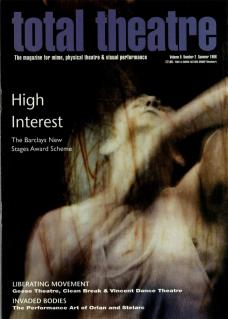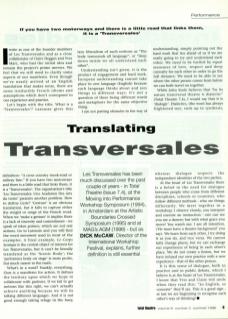I write as one of the founder members of Les Transversales and as a close collaborator of Claire Heggen and Yves Marc, who had the initial idea and remain the project's prime movers. We feel that we still need to clarify some aspects of our manifesto. Even though we've nearly arrived at an English translation that makes sense, there are some irreducibly French idioms and assumptions which don't correspond to our experience and practice. Let's begin with the title. What is a 'Transversales'? Larousse gives this definition: ‘A cross country trunk-road or railway line. If you have two motorways and there is a little road that links them, it is a Transversales'. The organisation's title 'Les Transversales: Une Academie Des Arts du Geste’ presents another problem. How to define Geste? 'Gesture' is an obvious translation, but it fails to capture either the weight or range of the French word. When we 'make a gesture' it implies there is a lack of sincerity and commitment – we speak of token gestures, which are not real actions. Go to Larousse and you will find the word movement used in most of the examples. A final example, Le Corps Scenique is the central object of interest for Les Transversales, but it can't be literally translated as the 'Scenic Body'; the 'performer’s body on stage' is more prolix, but much nearer to the truth.
What's in a word? Frankly, everything. Ours is a manifesto for action. It defines the territory upon which we hope to collaborate with partners. If we fail to get notions like this right, we can't actually achieve anything because we will be talking different languages. And it is not good enough taking refuge in the hazy, lazy liberalism of such notions as ‘the body transcends all language’, or ‘deep down inside we all understand each other’. Understanding isn't given, it is the product of engagement and hard work. European understanding cannot take place in one language (English) because each language thinks about and sees things in different ways: it's not a question of there being different words and metaphors for the same objective thing. I am not putting obstacles in the way of understanding, simply pointing out the hard work that lies ahead of us if we are really going to try and understand each other. We need to be fuelled by equal measures of love, respect and deep curiosity for each other in order to go the full distance. We need to be able to see where the other person comes from before we can both travel on together.
While John Keefe believes that ‘by its nature transversal theatre is dialectic’ (Total Theatre 7.4), I would say that it is ‘dialogic'. Dialectics, (the word has always frightened me), ends up in synthesis, whereas dialogue respects the independent identities of the two parties.
At the heart of Les Transversales there is a belief in the need for dialogue between people who come from different disciplines, schools or countries, who follow different methods – who see things differently. We meet together in a workshop; I observe closely, you interpret and execute an instruction – one can see you are a dancer, but with what grace you move! You watch me: I am all intention. ('He must have a theatre background', you say). We learn from each other, I try doing it as you do, and vice versa. We cannot fully change places, but we can exchange our experiences of being in each other's place. We do not create a fusion, but we have infused our own practice with a new experience – that of the other person.
It is this sense of dialogue, both in practice and in public debate, which I believe is at the heart of Les Transversales. I know that Yves and Claire will smile when they read this: ‘So English, so concrete’ they'll say. This is a good sign – at last we are beginning to recognise each other's way of thinking!

